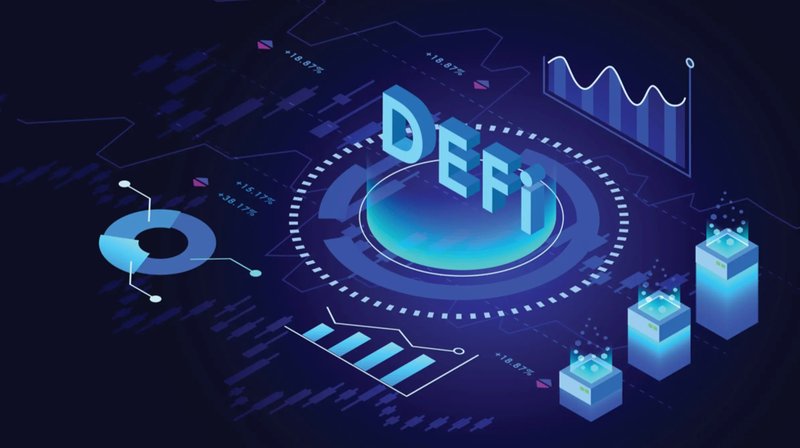Unlock Crypto's Potential: Why DeFi Matters in Decentralized Finance
Decentralized Finance offers a range of financial services for cryptocurrencies, including automated casinos, token exchanges, NFT marketplaces, and lending/borrowing apps.
Decentralized Finance, sometimes known as "DeFi," is one of the most significant uses of blockchain technology. DeFi aims to redesign the financial system utilizing decentralized and automated technologies. Decentralized Finance (DeFi) serves as Bitcoin's spiritual successor by giving cryptocurrency owners access to financial services like loans, savings, trading, and even cutting-edge financial instruments.
Bitcoin and blockchain technology were developed in response to the traditional financial system's greed and incompetence, which contributed to the 2008 Financial Crisis.
However, Bitcoin lacks the financial services that the traditional financial system offers, and there is no way to build those services without relying on a centralized infrastructure. So while the creation of Bitcoin was a remarkable achievement, it has since been surpassed by blockchain smart contracts, which were pioneered by Ethereum. These contracts enabled programmability for blockchain and paved the way for the thousands of cryptocurrencies and NFTs that exist today, as well as Web3 blockchain-based internet apps.
Soon after the launch of Ethereum in 2016, programmers started developing financial services for cryptocurrencies, which sparked the emergence of "DeFi." Decentralized Finance, which offers financial services for cryptocurrencies, is still a developing business, according to Investopedia. By approving transactions, protecting their assets, and spending their crypto through DeFi apps, Decentralized Finance members serve as their own banks rather than relying on banks.
DeFi is a fairly large category that encompasses many Web3 app kinds and complete asset classes. Stablecoins (cryptocurrencies with a stable value), which are widely used in DeFi apps and are helpful as a payment mechanism and by crypto lending/borrowing services like Aave, have formed the backbone of DeFi.
Decentralized Finance (DeFi) is also well-known for its decentralized exchanges, sometimes known as "DEXes," like Uniswap, which let users exchange between any two cryptocurrencies created on the same blockchain.
Non-fungible tokens, often known as "NFTs," are used in non-NFT DeFi apps that aren't officially Decentralized Finance but do use them to represent crypto deposits. NFT marketplaces like OpenSea have been a mainstay of the industry for years since they help NFTs gain value through trading.
DeFi Is A New Technology That Is Very Unrestrained

Although there are certain well-known Decentralized Finance (DeFi) platforms—also known as "blue chip" protocols—that are safe to use, the DeFi sector is still unexplored territory full of new and experimental concepts, much like the Wild West. Unfortunately, a lot of these concepts either fall victim to unanticipated difficulties or are targeted by hackers and crypto phishing scams.
DeFi has developed a bad image as a hazardous environment that resembles a haven for gamblers. DeFi's degree of risk is mostly determined by the choices users make and how well they comprehend the ideas at play. Regulators have also been watching DeFi closely because they are worried about the company's noncompliance with Know Your Customer (KYC) and Anti-Money Laundering (AML) regulations, which are criteria that traditional banking institutions follow. Because DeFi apps are immutable, they frequently fail to meet these requirements.
According to reports from Decentralized Finance Pulse as of September 2022, a staggering $26.3 billion worth of assets are locked in DeFi smart contracts, with the highest amount reaching $45.5 billion in October 2021.
Despite being a relatively small market with much to learn, DeFi's utility and widespread applications could propel it into becoming a multi-trillion-dollar sector in the future.
DeFi may represent an existential danger to established banking systems, but it is more likely that the two will coexist and develop mutually beneficial relationships.
According to Fireblocks, Aave has already embraced this concept via Aave Arc, a permission lending pool for institutional clients. It appears that banks will eventually implement their own smart contracts to interact with blockchain technology, transmitting and receiving stablecoins.
Though it is still in its infancy, DeFi, which seeks to offer financial services for cryptocurrencies and blockchain assets, has the potential to grow into a significant worldwide sector. For now, it's a haven for visionaries, con artists, hackers, nerds, and gamblers alike.
Still, a plethora of DeFi apps have demonstrated their dependability and security. DeFi is positioned to develop into a prominent financial technology that is utilized by people all around the world with ongoing enhancements made to the user experience.

 Hamid Salman
Hamid Salman